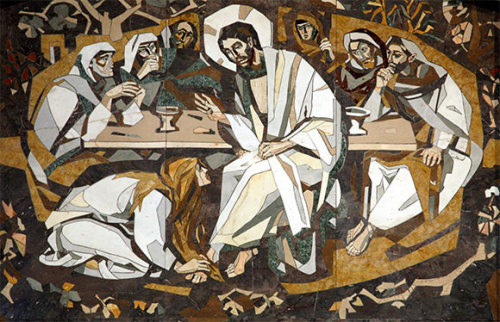Ash Wednesday
Today is Ash Wednesday, the first day of Lent—which is to say, the first day of a season when Christians reflect upon their mortality (“ashes to ashes and dust to dust”) and their longing for God. The transition from dust to resurrection is famously captured in T. S. Eliot’s “Ash Wednesday,” which was one of the first poems the poet wrote after his Christian conversion. While much of “Ash Wednesday” seems a continuation of such bleak poems as “The Hollow Men” and “The Waste Land,” with its images of dust and bones, it differs from those earlier works in that it ends on a note of hope. (I’ve written about it here and here.) Although, in the final stanza, he may still be sitting “among these rocks,” the Virgin Mary has given him a glimpse of peace and divine connection:
Blessèd sister, holy mother, spirit of the fountain, spirit
of the garden,
Suffer us not to mock ourselves with falsehood
Teach us to care and not to care
Teach us to sit still
Even among these rocks,
Our peace in His will
And even among these rocks
Sister, mother
And spirit of the river, spirit of the sea,
Suffer me not to be separated
And let my cry come unto Thee.
While I admire Eliot, I love Denise Levertov, who deals with similar themes. In “The Poem Rising by Its Own Weight,” she argues that Christ is only to be found when we face up to our frailty and vulnerability. (The poem appears in her collection The Freeing of the Dust.) Levertov is generally allergic to those who are smug about their faith, and in this poem she imagines such people, after confidently performing a high wire act over a dark pit, taking a tumble.
Pride, we could say, cometh before the fall as we find ourselves rolling “over and down a steepness into a dark hole.” Only after we have fallen, she states, does the miracle walk in, “on his swift feet, down the precipice straight into the cave.”
It’s interesting that Levertov frames this this drama is put in terms of poetic creation (“The Poem Rising by Its Own Weight). Poets too are tightrope walkers juggling fiery knives, and sometimes the poem emerges when it all appears that all is lost. Or as Levertov puts it, it rises by its own weight:
The Poem Rising by Its Own Weight
The poet is at the disposal of his own night—Jean CocteauThe singing robes fly onto your body and cling there silkily,
You step out on the rope and move unfalteringly across it,
And seize the fiery knives unscathed and
Keep them spinning above you, a fountain
Of rhythmic rising, falling, rising
Flames,
And proudly let the chains
Be wound about you, ready
To shed them, link by steel link,
padlock by padlock–but when your graceful
confident shrug and twist drives the metal
into your flesh and the python grip of it tightens
and you see rust on the chains and blood in your pores
and you roll
over and down a steepness into a dark hole
and there is not even the sound of mockery in the distant air
somewhere above you where the sky was,
no sound but your own breath panting:then it is that the miracle
walks in, on his swift feet,
down the precipice straight into the cave,
opens the locks,
knots of chain fall open,
twists of chain unwind themselves,
links fall asunder,
in seconds there is a heap of scrap-
metal at your ankles, you step free and at once
he turns to go —but as you catch at him with a cry,
clasping his knees, sobbing your gratitude,
with what radiant joy he turns to you,
and raises you to your feet,
and strokes your disheveled hair,
and holds you,
holds you,
holds you
close and tenderly before he vanishes.
The poet acknowledges that the comfort she experiences is only momentary. Like the disciples when they see Jesus’s transfiguration, they can’t hold on to the moment, no matter how much they would like to, but it’s enough that there has been this moment of radiant joy. Or to cite another Biblical passage, after falling, the poet imagines herself as the woman who knelt at Jesus’s feet. Jesus’s promise is that he will hold, hold, hold us, closely and tenderly.
